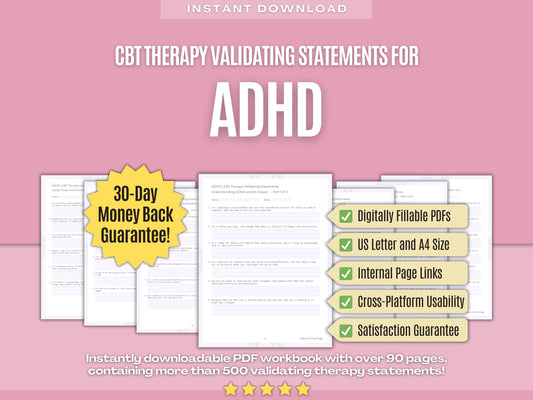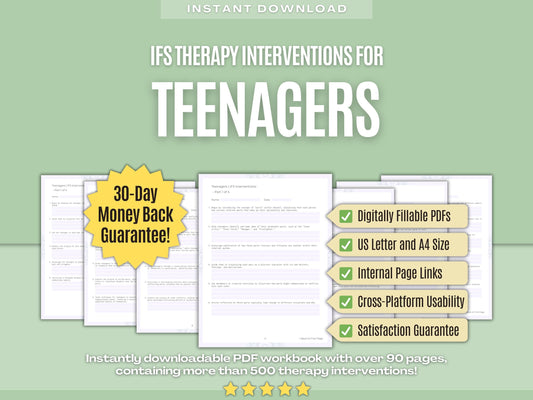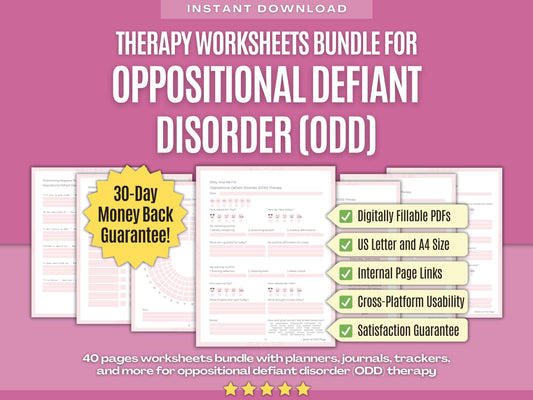Elevate Your Therapy and Guide Your Clients to Inner Healing with Our Attention Deficit Disorder (ADD) Therapy Session Questions! ✨
1. Starting ADD Therapy
- What prompted you to seek therapy for your ADD at this particular time in your life?
- How would you rate your current level of satisfaction with your ability to manage your ADD symptoms?
- Have you had any previous experience with therapy or counseling for ADD or other mental health concerns?
- Are there any particular areas of your life where you feel your ADD symptoms have been particularly challenging or disruptive?
- How do you typically respond to stress or situations that require sustained attention and focus?
- What role do you believe your environment plays in either exacerbating or alleviating your ADD symptoms?
- Are there any concerns or reservations you have about beginning therapy for ADD at this time?
- How do you perceive the impact of your ADD symptoms on your relationships with family, friends, or coworkers?
- Are there any lifestyle factors, such as sleep habits or nutrition, that you believe may influence your ADD symptoms?
- Can you recall any significant life events or transitions that may have affected your experience with ADD?
- How would you describe your level of self-awareness regarding your ADD symptoms and their effects on your life?
2. ADD Psychoeducation
- Can you describe your understanding of Attention Deficit Disorder (ADD) and how it manifests in your life?
- How familiar are you with the neurobiological basis of ADD and its impact on cognitive functioning?
- Have you explored the genetic component of ADD and its potential implications for family members?
- How would you describe the core symptoms of ADD, including inattention, hyperactivity, and impulsivity?
- Have you considered the potential overlap between ADD and other conditions, such as anxiety, depression, or learning disabilities?
- Can you identify any strengths or positive traits associated with ADD that you may not have previously considered?
- Have you explored the impact of ADD on various domains of functioning, including academic, occupational, and social?
- Are you familiar with the evidence-based treatments for ADD, including medication, behavioral therapy, and lifestyle interventions?
- Have you encountered any challenges or barriers to accessing accurate information or resources about ADD?
- How do you perceive the stigma surrounding ADD, and how has it affected your willingness to seek help or disclose your diagnosis?
- Have you explored any alternative or complementary approaches to managing ADD symptoms, such as mindfulness or dietary changes?
3. Mindfulness for ADD
- How familiar are you with the concept of mindfulness and its potential benefits for managing symptoms of Attention Deficit Disorder (ADD)?
- Can you describe any specific challenges you encounter in maintaining focus or attention in your daily life due to your ADD symptoms?
- How do you perceive the relationship between mindfulness and managing symptoms of impulsivity associated with ADD?
- What role do you believe mindfulness could play in enhancing your ability to regulate emotions often affected by ADD symptoms?
- How do you typically respond to moments of frustration or overwhelm when your ADD symptoms feel particularly challenging?
- How do you view the idea of incorporating mindfulness into your daily routine to support your overall well-being and symptom management?
- What strategies have you already tried for improving attention and focus, and how effective have they been for you?
- How do you perceive the potential benefits of mindfulness in reducing stress and anxiety often experienced alongside ADD?
- Have you considered the role of mindfulness in promoting self-compassion and acceptance of your ADD-related challenges?
- Are you familiar with any mindfulness apps or resources that you believe could support your practice outside of therapy sessions?
- Can you identify any potential obstacles or barriers you may encounter in establishing a consistent mindfulness practice?
4. Dialectical Behavior Therapy (DBT) for ADD
- How familiar are you with Dialectical Behavior Therapy (DBT) and its potential application in managing symptoms of Attention Deficit Disorder (ADD)?
- What are your expectations or goals for participating in DBT as part of your treatment plan for ADD?
- How do you perceive the relationship between your emotions, thoughts, and behaviors in relation to your ADD symptoms?
- Can you identify any patterns or triggers for emotional reactivity or mood instability that you believe DBT could help you address?
- Can you recall any past experiences where you were able to effectively apply coping skills to regulate intense emotions despite your ADD symptoms?
- How do you view the idea of incorporating distress tolerance skills into your daily routine to help navigate challenging situations or triggers?
- Can you identify any cognitive distortions or biases that may influence your perception of yourself or others in the context of your ADD symptoms?
- Are you willing to explore and challenge any black-and-white thinking patterns that may contribute to difficulties in problem-solving or decision-making?
- How do you feel about incorporating diary cards or other tracking tools to monitor emotions, behaviors, and coping skills as part of your DBT practice?
- What are your thoughts on developing a crisis survival plan to proactively address potential crises or setbacks in managing your ADD symptoms?
- Are you interested in exploring the connection between self-compassion, acceptance, and emotional regulation within the context of DBT?
5. Interpersonal Therapy (IPT) for ADD Challenges
- How familiar are you with Interpersonal Therapy (IPT) and its potential application in addressing challenges related to Attention Deficit Disorder (ADD)?
- What are your expectations or goals for participating in IPT as part of your treatment plan for ADD?
- How do you perceive the relationship between your ADD symptoms and your interpersonal relationships?
- How do you typically respond to situations where your ADD symptoms impact your ability to effectively communicate or connect with others?
- What strategies have you already tried for managing the impact of your ADD symptoms on your interpersonal relationships, and how effective have they been for you?
- Are you interested in learning and practicing specific communication skills or conflict resolution techniques to improve your interpersonal functioning despite the challenges posed by ADD?
- How do you perceive the potential role of self-awareness and self-reflection in understanding and addressing interpersonal challenges associated with ADD?
- Can you identify any potential obstacles or barriers you may encounter in implementing IPT strategies for managing your ADD symptoms and improving your interpersonal functioning?
- How do you feel about incorporating insights from IPT into your daily life to help you navigate relationships and interactions more effectively despite the challenges posed by ADD?
- How do you envision applying the skills and insights gained from IPT for ADD to other areas of your life beyond therapy sessions?
- What are your goals for integrating IPT into your overall treatment plan for ADD, and how do you see it complementing other interventions?
6. Emotion-Focused Therapy (EFT) for ADD
- How have you been feeling emotionally since our last session, particularly in relation to your attention deficit disorder?
- What emotions do you typically experience when you find it challenging to focus or complete tasks due to your ADD?
- How do you typically cope with the frustration or overwhelm that can come with managing your attention deficit disorder?
- How do you think your emotions impact your ability to manage your attention deficit disorder effectively?
- What strategies have you found helpful in regulating your emotions when they are heightened by your ADD symptoms?
- How do you feel about seeking support for your emotional well-being in addition to managing your ADD symptoms?
- How would you describe your relationship with your emotions in general, and how does it intersect with your ADD?
- What role do you believe self-compassion plays in managing the emotional challenges of ADD?
- Are there any negative beliefs or self-judgments that you hold about yourself in relation to your attention deficit disorder?
- Can you identify any ways in which your emotions serve as valuable information or signals regarding your ADD management?
- What role do mindfulness techniques play in helping you navigate the emotional aspects of your attention deficit disorder?
7. Psychodynamic Insights for ADD
- Can you reflect on your earliest memories or experiences related to attention deficit disorder, and how do you believe they may shape your current patterns of behavior and thought?
- Can you identify any unresolved conflicts or unresolved emotions from your past that you believe may be contributing to your attention deficit disorder symptoms?
- Are there any significant losses or separations that you have experienced in your life, and do you notice any impact on your symptoms of ADD?
- How do you cope with feelings of inadequacy or inferiority that may arise from your attention deficit disorder symptoms, and do you notice any underlying psychological processes at play?
- How do you perceive your role within your family dynamics, and do you notice any connections between these dynamics and your experience of ADD?
- How do you navigate relationships and intimacy in light of your attention deficit disorder, and do you notice any unconscious patterns or defenses influencing your behavior?
- How do you cope with feelings of loneliness or isolation that may arise from your attention deficit disorder symptoms, and do you notice any unconscious motivations underlying these feelings?
- Can you identify any patterns of behavior or coping mechanisms that you use to manage the challenges posed by your attention deficit disorder, and how do you interpret them within a psychodynamic perspective?
- Can you recall any significant attachments or separations in your life, and do you notice any impact on your symptoms of attention deficit disorder?
- Can you envision a future version of yourself who has come to terms with and effectively managed their attention deficit disorder, and what steps can you take to move towards that vision?
- Can you reflect on any patterns of procrastination or avoidance that you have noticed, and do you believe they may be connected to deeper psychological dynamics?
8. Music Therapy for ADD Focus
- How does music impact your ability to focus and concentrate, especially in moments when you're experiencing challenges with your attention deficit disorder?
- What emotions or sensations arise when you listen to music, and how do these experiences intersect with your ADD symptoms?
- How do you incorporate music into your daily routine as a means of supporting your attention and concentration?
- How does engaging with music as a form of therapy contribute to your overall well-being and sense of balance amidst the challenges posed by your ADD?
- How do you perceive the connection between music and memory, and how might this connection be leveraged to support your cognitive functioning with ADD?
- How does the rhythm and tempo of music influence your energy levels and ability to sustain focus, and how can you use this awareness to optimize your productivity?
- How do you use music as a tool for self-regulation and emotional expression when faced with challenges related to your ADD symptoms?
- How does engaging with music in a therapeutic context foster a sense of connection and belonging in relation to your experiences with attention deficit disorder?
- How do you perceive the impact of background music or ambient sounds on your ability to maintain attention and block out distractions in various environments?
- How does the act of creating and curating playlists contribute to your sense of agency and empowerment in managing your attention deficit disorder symptoms?
- What role does music play in facilitating relaxation and stress reduction for you, and how can you incorporate music into your self-care routine to support your overall well-being with ADD?
9. Wrapping Up ADD Therapy Sessions
- Reflecting on our time together, what stands out to you as the most significant insights or changes you've experienced throughout our ADD therapy sessions?
- Can you identify any specific strategies or techniques that you've found particularly helpful in coping with your ADD symptoms during our therapy sessions?
- Can you reflect on any challenges or obstacles you encountered during the therapy process, and how did you navigate through them?
- How have your perceptions or understanding of attention deficit disorder evolved throughout the course of our therapy sessions?
- How do you plan to maintain the momentum and progress you've achieved in therapy once our sessions have concluded?
- How have you integrated self-care practices into your routine to support your mental health and well-being, particularly in relation to managing attention deficit disorder?
- How do you envision your future with attention deficit disorder, and what steps are you willing to take to continue thriving and growing?
- How have you cultivated resilience and coping skills in navigating the challenges posed by attention deficit disorder, and how do you plan to continue strengthening these abilities?
- How have you incorporated mindfulness and self-awareness practices into your daily life to support your journey with attention deficit disorder?
- How do you plan to continue fostering a sense of connection and support in managing your attention deficit disorder beyond the therapy room?
- How do you plan to celebrate your achievements and successes in managing attention deficit disorder as you continue on your journey?
10. Conclusion of ADD Therapy
- As we bring our ADD therapy sessions to a close, how do you feel about the progress you've made and the insights you've gained throughout our time together?
- How do you plan to continue applying the strategies and techniques you've learned in therapy to manage your attention deficit disorder in your daily life?
- How has your understanding of attention deficit disorder evolved since we began therapy, and how do you plan to continue learning and growing in this area?
- How have you cultivated resilience and coping skills to navigate the challenges posed by attention deficit disorder, and how do you plan to continue strengthening these skills?
- How have you integrated self-care practices into your routine to support your mental health and well-being, particularly in relation to managing attention deficit disorder?
- How do you plan to maintain the momentum and progress you've achieved in therapy once our sessions have concluded?
- How have you fostered a sense of connection and support in managing your attention deficit disorder, both within and outside of therapy?
- How do you plan to advocate for your needs and prioritize your mental health and well-being in your personal and professional life post-therapy?
- How do you plan to celebrate your achievements and successes in managing attention deficit disorder as you continue on your journey?
- How do you envision your future with attention deficit disorder, and what steps are you willing to take to continue thriving and growing?
- How do you plan to continue fostering a sense of mindfulness and self-awareness in your daily life to support your journey with attention deficit disorder?
We hope that our therapy session questions for Attention Deficit Disorder (ADD) therapy will help you to elevate your therapy practice and guide your clients to inner healing! Do you need more therapy session questions for Attention Deficit Disorder (ADD) therapy? Find them all in our Digital Workbook! Or do you have any questions or suggestions for us? Please feel free to contact us at any time!


















